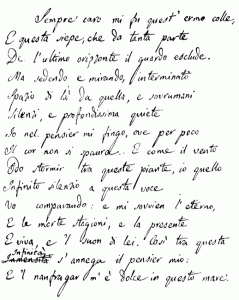Siren song
My city with its uphill loves,
my Genoa all full of sea and steps
and, rising from the harbour, whirlpools of living
life all the way up to reach the ridges
of the sheet-metal roofs, now with what
forcefulness inside me, here where each word
has turned to lead, does it quiver once again
with iodine and salt upon my fingertips
which ache on my type-writer’s keys? Oh, the coal
at sky-blue Di Negro! Oh the foghorns,
at night just when one’s eyes have closed,
and in one’s heart the pain of the future
is opened by a roller shutter
crashingly shaken by a closing door.
Listen to the poem here:
Sirena
La mia città dagli amori in salita,
Genova mia di mare tutta scale
e, su dal porto, risucchi di vita
viva fino a raggiungere il crinale
di lamiera dei tetti, ora con quale
spinta nel petto, qui dove è finita
in piombo ogni parola, iodio e sale
rivibra sulla punta delle dita
che sui tasti mi dolgono? …Oh il carbone
a Di Negro celeste! oh la sirena
marittima, la notte quando appena
l’occhio s’è chiuso, e nel cuore la pena
del futuro s’è aperta col bandone
scosso di soprassalto da un portone.
Commentary: Giorgio Caproni grew up in Genoa. He spent the second part of his life in Rome and many of his poems are about his love for Genoa.
The title is “Sirena”. Caproni uses the word in line 10 to mean the foghorns he heard in the harbour. But “sirena” also means one of the sirens of antiquity who called out to sailors. I believe the title refers to the ceaseless call of Genoa which he always felt. I have therefore decided to use “Siren song”.
Caproni begins: “my city with its uphill loves”. He explained that when he was young the only place you could be alone with a girl was one of the narrow alleys which climb steeply from the seafront. Thus loves were always uphill (for the girls, presumably, they were downhill).
The second line is “Genova mia di mare tutta scale”. You could read this simply as “My Genoa, on the sea, all steps”. But Caproni uses no punctuation and you could read “di mare tutta” as meaning “all sea”. So all sea and also all steps if one reads the words as compressed together. This, actually, is a feeling one has in Genoa, where the steep climbs mean that you even at a distance you feel and see the sea as right behind you.
Di Negro is a wharf in the harbour where coal was unloaded.
I interpret the last lines as the poet thinking of the cradle-like sound of foghorns (at least in my experience, having lived near a harbour myself) and being brought back to reality by the noise of a metal shutter. The Italian “scosso di soprassalto” (suddenly shaken) mimics the sound, and I felt that “crashingly shaken” could reproduce this effect at little cost since “suddenly” is understood anyway.
